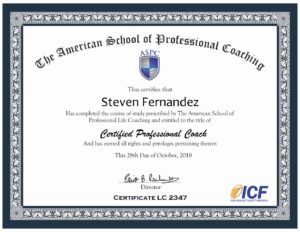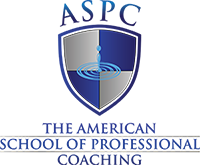“Dr. Rosenbaum’s passion for coaching shines through his curriculum. It’s easy to understand the concepts behind Professional Coaching, but it’s the classroom application which ASPC training provides you that helps re-pattern your responses to better accommodate your client’s best interest, giving you the confidence to move forward with your journey as a successful life coach. Thank you, Dr. Rosenbaum, for doing what you do, and making this training accessible!!” – Krissy, CPC
Certified Associate Coach (CAC) Course Curriculum (Level 1)
At ASPC, we train our students to first master the coaching foundations and then develop their coaching toolbox.
Review the general curriculum for our Certified Professional Coach (CAC) program below. If you have questions after reviewing our program, please contact us at info@thecoachschool.org. We will be happy to answer your questions. Please note that our programs are taught in English.
Certified Associate Coach (CAC) Training Program (30 Credit Hours)
1. The Ethics of Coaching
Ethics are the bedrock of creating a safe environment for our client’s to open-up fully and begin to deeply self-reflect to the point where they find their deepest solutions. Primary in this training is learning how to identify mental health concerns that require a referral to a licensed mental health professional.
2. Transformational Listening & Questioning
ASPC’s core philosophy is that as coaches, we do not have to have all the answers to our clients’ problems – rather, we have the skills to draw their best solutions for themselves out of them. We do this through creating a deep and reflective thinking space using transformational listening and questioning: the kind of listening that is free of interruptions, assumptions and judgments and the kind of questions that make us deeply self reflect and come up with our own best solutions.
3. Non-Verbal Communication
ASPC provides a strong focus on the non-verbal communication that our client’s provide us. The inflections of their voice when discussing certain topics or the twinkle in their eye when providing face-to-face coaching are important cues to our clients’ deepest passions as well as their blocks to success. By learning to be aware of these cues and developing the skills to mirror important information back to our clients we can catalyze major breakthroughs for our clients.
4. The Three Stages of Coaching
ASPC teaches the three primary stages of effective coaching: Understanding, Working and Ending:
a. In the Understanding Phase we work with our clients to identify what their true goals are for coaching. We do not begin working with clients until the coach and client know with clarity what they want. Great coaches know that the greatest block most people have in their lives is that they are not clear about what they want for their lives and this stage requires learning to block out all the “noise” in their mind so they can hear their own inner thoughts clearly.
b. In the Working Phase we are working together with our clients to help them meet their deepest goals through developing clear Values, Intentions and Goals. We also help our clients remove Blocks that stand in the way to their success or identify a specialist in this area.
c. Finally, in the Ending Phase, we work with our clients to identify their Action Plan – what they will be doing to further their goals step-by-step.
5. The ICF Core Competencies
Students learn how to integrate the ICF’s 8 Core Competencies into their coaching work as the central guide for their coaching.
Here are the 8 core competencies.
- Demonstrates Ethical Practice
- ICF Core Competency 2 Embodies a Coaching Mindset
- ICF Core Competency 3 Establishes and Maintains Agreements
- ICF Core Competency 4 Cultivates Trust and Safety
- ICF Core Competency 5 Maintains Presence
- ICF Core Competency 6 Listens Actively
- ICF Core Competency 7 Evokes Awareness
- ICF Core Competency 8 Facilitates Client Growth
After completing CAC, students are invited to take the CPC course which adds an additional 30 ICF hours for a total of 60 ICF classroom hours.
Certified Professional Coach (CPC) Training Program (60 Credit Hours)
1. Solution Oriented Coaching
A powerful 10-step method of helping clients move through the Three Stages of Coaching. The focus is on drawing out our client’s natural strengths and solutions so that the client is empowered by the coaching process and recognizes that they are the experts in their lives. Solutions created by clients rather than by coaches are organic to the client and are a perfect fit to their personalities and strengths. Coaching using this process places the client into the driving seat of their own lives and allows coaches to work with people from all walks of life.
2. Values Processing Coaching
ASPC provides a strong emphasis on helping clients listen to themselves and to differentiate between their Core Values (what they want and believe) from External Values (values that they have absorbed from their environment that are not consistent with their Core Values). Coaches assist their clients to formulate a Mission Statement for their lives that is consistent with their Core Values as well as life Goals that are real-life expressions of their Core Values. ASPC trained coaches help their clients live lives that are consistent with their Core Values.
3. The Art and Science of Positive Psychology
Students learn about positive psychology which is the science of thriving. Having studied thousands of thriving people, positive psychologists have identified the key components to a thriving life. Participants learn the key scientific components, the primary tools used by positive psychologists and experience these tools themselves through guided practices during the class.
4. Mastering the Mind: The Mindfulness Coach’s Toolbox
Students learn about the science of mindfulness, the mental state achieved by focusing one’s awareness on the present moment, while calmly acknowledging and accepting one’s feelings, thoughts, and bodily sensations. Used by meditation masters and Harvard trained physicians, mindfulness practices are recognized as deeply effective methods of stress reduction across the globe. Participants in this workshop learn the key scientific components, the primary tools used by mindfulness experts and experience these tools themselves through guided practices during the class.
5. Advanced Transformational Listening Skills
CPC students learn about Advanced Transformational Listening Skills. Transformational Listening is a tool developed by ASPC founder, Dr. Elliott Rosenbaum, that quickly and powerfully changes the way we listen to other people. Using the science of mirror neurons, participants learn how to shift what others are able to achieve in their minds through how we listen to them. CPC students will further their Transformational Listening skills to an advanced level in this course.
6. Mastering Powerful Coaching Questions
Students continue to learn about the science of Powerful Questions, the kind of questions that deepen thinking and ignite the human mind. Students will deepen their toolbox of powerful questions and learn how to use their own intuition to guide the process of asking powerful coaching questions.
Certification

CPC graduates have completed 60 credit-hours of training centered around the ICF Core Competencies, two examinations (ethics and core competencies) 10 hours of mentor coaching and have successfully passed two performance evaluations of 30-minute coaching sessions.
After completing CPC, students are invited to take the CMC course which adds an additional 65 ICF hours for a total of 125 ICF classroom hours.
Certified Master Coach (CMC) Training Program (125 Credit Hours)
Master level training is designed to create the ambassadors of professional coach training. Students who have successfully completed their certified professional coach (CPC) training are given the option to enroll in ASPC’s Certified Master Coach (CMC) training. CMC candidates are trained as coach trainers and become coaching masters in the true sense of the word. The curriculum includes:
1. Coaching the Essential Self
Students learn how to move clients beyond self-measurement, self-comparison and living for the future to living life from a place of “radical self-acceptance”, intrinsic motivation, being in the moment and child-like play in all areas of life. Coaches develop their Essential Self in the process and learn how to create a learning environment for their clients that is natural and flowing.
2. Coaching for Strengths
Students learn how to conduct strengths-based assessments to assist clients to identify their core strengths and develop a life around using those strengths in ways that are meaningful and fulfilling. Students experience these assessments on themselves as a self-development and learning tool and are supervised in the strengths assessment and coaching of a client.
3. The Coaching Content Studio
Students learn how to create original coaching content that furthers the field of professional coaching and also serves as a specialized offering for the student to use in their coaching practice. Students are coached by a mentor in the creation of this content and master students deliver this content to other coaches with a 360-feedback process.
4. Coach Training Seminar
Students learn how to teach others how to integrate coaching tools in a way that is experienced as organic and self-motivating rather than classic command and control teaching. Master students learn how to give feedback to other master students in an honest, appropriate, respectful and direct way and that is in keeping with ICF competencies and masteries.
ASPC is proud to meet the highest standard of life coach training in the world.
